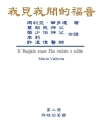In 'The Causes of the Corruption of the Traditional Text of the Holy Gospels, ’ John William Burgon delves into the intricate web of textual criticism, seeking to unravel the complexities surrounding the biblical texts. Employing a meticulous analytical style, Burgon identifies historical and theological factors contributing to the textual variations in the Gospels. His work is situated within the broader context of 19th-century debates over biblical authenticity, resonating with contemporaneous scholarly discourse on the preservation of sacred manuscripts and the implications of textual alterations on doctrinal integrity. Burgon’s deployment of rigorous argumentation and thorough examination of manuscript evidence seeks to bolster the case for a traditional, ecumenically respected text of the Gospels. John William Burgon, an Anglican clergyman and scholar, was deeply influenced by his commitment to the doctrinal purity of the Church. His scholarly pursuits in divinity and his critiques of the emerging textual criticisms of the time were rooted in a desire to protect the integrity of scripture from what he perceived as modernist encroachments. Burgon’s personal convictions and intellectual background led him to craft this robust defense of the traditional text, providing a counter-narrative to the prevailing critical theories. This book is indispensable for theologians, biblical scholars, and lay readers alike, as it not only elucidates the historical dilemmas regarding the Gospels’ preservation but also challenges contemporary readings through Burgon’s erudite lens. Engage with Burgon’s compelling arguments and gain a deeper understanding of the nuances involved in textual integrity and the significance of adhering to traditional interpretations.
O autorze
Reverend John William Burgon (1813–1888) was a figure of considerable import in the scholarly ecclesiastical realms of the 19th century. His scholarly activities were deeply entwined with his clerical work, leading to a passionate defense of Biblical authority and orthodox Christianity against rising critical methodologies of the time. Best known for his emphatic support for the traditional text of the New Testament, Burgon’s erudition was most notably encapsulated in his comprehensive work, 'The Causes of the Corruption of the Traditional Text of the Holy Gospels’. In this seminal piece, Burgon meticulously critiques what he perceives as inaccuracies and fallacies within the modern textual criticism of his era, staunchly advocating for the Textus Receptus and Byzantine text-type over the Alexandrian text-type favored by contemporary scholars. His literary style, characterized by a combination of academic rigor and a preacher’s zeal, often polarized his audience — garnering both commendation for his scholarly dedication and critique for his perceived intransigence. Through his substantial contribution to the field of New Testament textual criticism, John William Burgon remains a respected, if contentious, figure whose work continues to influence theological and biblical studies.












